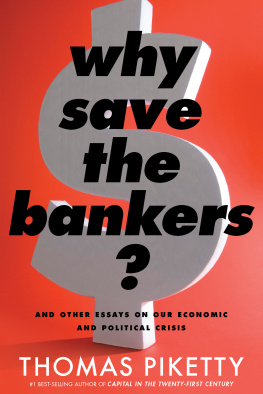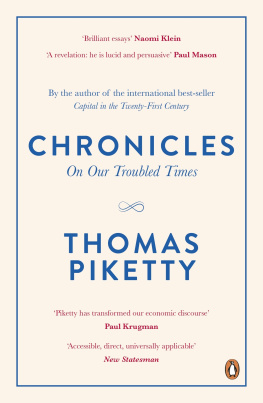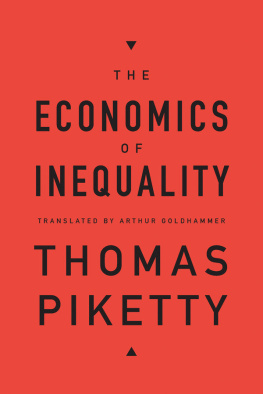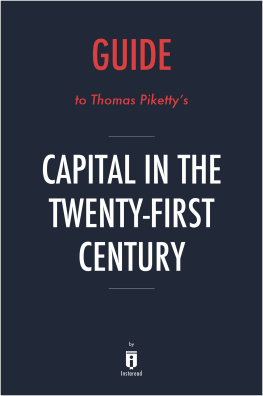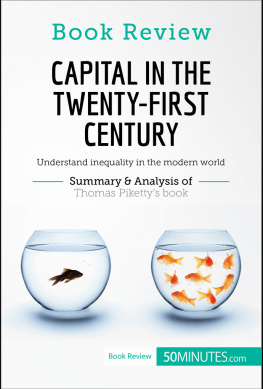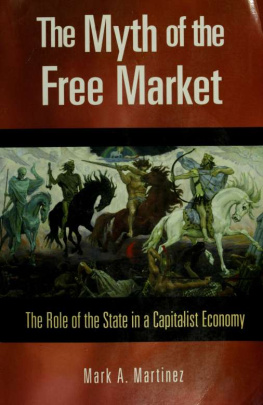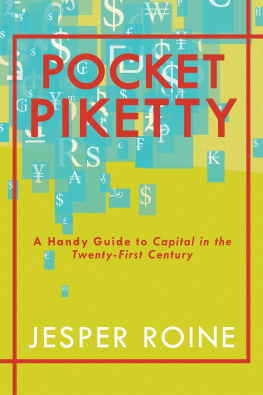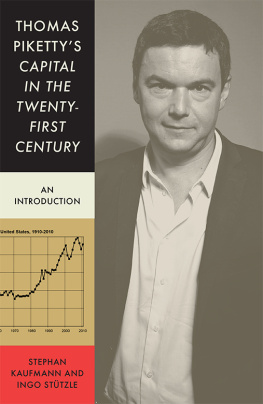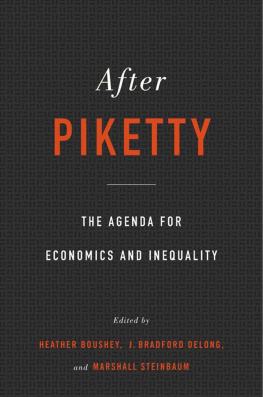Copyright 2012 by ditions Les Liens qui Librent and Copyright 2016 by ditions Les Liens qui Librent
Portions of this book were previously published in Peut-on sauver lEurope? and will be published in Chroniques 20122016.
Translation and annotation copyright 2016 by Seth Ackerman
All rights reserved
For information about permission to reproduce selections from this book, write to or to Permissions, Houghton Mifflin Harcourt Publishing Company, 3 Park Avenue, 19th Floor, New York, New York 10016.
www.hmhco.com
The Library of Congress has cataloged the print edition as follows:
Names: Piketty, Thomas, (date) author.
Title: Why save the bankers? : and other essays on our economic and political crisis / Thomas Piketty ; translated from the French by Seth Ackerman.
Description: Boston : Houghton Mifflin Harcourt, 2016. | Includes index.
Identifiers: LCCN 2015038221 | ISBN 9780544663329 (hardcover) | ISBN 9780544663299 (ebook) | ISBN 9780544868847 (pbk. (international edition))
Subjects: LCSH: Financial crisesEurope. | Global Financial Crisis, 20082009. | Banks and banking, CentralEurope. | Monetary policyEurope. | EuropeEconomic policy. | EuropeEconomic conditions21st century. | EuropePolitics and government21st century.
Classification: LCC HB3782.P55 2016 | DDC 330.94dc23
LC record available at http://lccn.loc.gov/2015038221
Dollar sign image Caspar Benson/fstop/Corbis
Jacket design: Michaela Sullivan
v1.0316
Translators Note
I have translated these essays as they originally appeared in the pages of the French newspapers Libration and, in one case, Le Monde. Since they often refer to people and events that would have been familiar to a French newspaper reader, but not necessarily to readers of this book, I have added explanatory notes, situating them in the context of their time, and defining some French references.
Because many of these essays discuss the Eurozone crisis and assume a working knowledge of the functioning of the European Union, it may be useful to sketch a few relevant facts. The EUs executive branch is composed of two decision-making bodies. The European Council, or Council of Heads of State, brings together national leaders at regular closed-door summits focused on setting broad policy priorities and resolving high-level disagreements. The Council of the European Union is made up of national ministers who meet regularly to set policy in specific areas. Those bodies work together with the appointed European Commission, an elite executive institution that administers policy and proposes legislation, often on the urging of the European Council. Legislation generally must be approved by both the European Council and the directly elected European Parliament. The EUs ensemble of institutions also includes judicial and monetary authorities: the European Court of Justice and the European Central Bank, or ECB.
During the period in which these essays were written, Croatias integration into the EU brought the total number of member states to twenty-eight. When the first articles in this book were published, seventeen of those states shared the euro as their common currency; at the time of this writing, that number stood at nineteen. This group of EU states, collectively called the Eurozone, is expected to expand furtherprovided the euro survives.
Preface
JANUARY 2012
This book brings together many of my published monthly newspaper columns, with no subsequent updating or revision. Some of these pieces have aged a bit, others less so. Taken together, they represent one social scientists effort to understand and analyze the day-to-day world, to get involved in the public debate; an attempt to reconcile the rigors and responsibilities of scholarship with those of citizenship.
The years during which these columns were written were deeply marked by the world financial crisis that began in 20078 and is still ongoing. On several occasions, I tried to understand the new role of central banks as they sought to avert a collapse of the world economy, or to analyze the similarities and differences between the Irish and Greek crises. Not to mention traditional domestic topics, still vital for our common future. But toward the end of the period, one question began to eclipse all the others: Will the European Union be able to live up to the hopes that so many of us have placed in it? Will Europe manage to become the continental power, and the space for democratic sovereignty, that well need in order to take control of a globalized capitalism gone mad? Or will it once again be no more than a technocratic instrument of deregulation, intensified competition, and the subjection of governments to the markets?
At first glance, the financial crisis that began in the summer of 2007 with the collapse of the U.S. subprime mortgage market and the September 2008 bankruptcy of Lehman Brothers can be seen as the first crisis of twenty-first-century globalized patrimonial capitalism.
Lets review. Starting in the 1980s, a new wave of financial deregulation and an outsized faith in self-regulating markets descended on the world. The memory of the Great Depression of the 1930s and the cataclysms that followed had faded. The stagflation of the 1970s (a mixture of economic stagnation and inflation) had showed the limits of the Keynesian consensus of the 1950s and 60s, hastily constructed in the specific context of the postwar decades.deregulation movement began in 197980 in the United States and United Kingdom, where there was rising unease as the economies of Japan, Germany, and France caught up withand, in the British case, surpassedtheir own. Riding the wave of discontent, Ronald Reagan and Margaret Thatcher explained that government was the problem, not the solution. They called for escaping a welfare state that had made entrepreneurs soft, a return to the pure capitalism of the preWorld War I era. The process accelerated and then spread to continental Europe after 199091. The fall of the Soviet Union left capitalism without a rival, and a new era began in which many chose to believe in an end of history and a new economy based on permanent stock market euphoria.
In the early 2000s, stock market and real estate values in Europe and the United States matched and then surpassed their previous peaks, dating to 1913. Thus, in early 2007, on the eve of the crisis, French households financial and real estate wealth (net of debt) reached 9.5 billion, six years worth of national income. French wealth fell slightly in 20089, but started climbing again in 2010, and now exceeds 10 trillion. If we put these figures in historical perspective, we can see that wealth hasnt been this robust in a century. Today, private net wealth is still equal to nearly six years worth of national income, compared to less than four years in the 1980s, and less than three years in the 1950s. You would have to go back to the Belle poque (19001910)
It can be seen, incidentally, that wealth owners current prosperity isnt simply due to deregulation. Its also, and chiefly, a long-term catch-up phenomenon after the violent shocks of the early twentieth century, as well as a phenomenon linked to the slow growth of recent decades, which automatically leads to extremely high wealth-to-income ratios. The enduring fact is that we live in an era when wealth in the rich countries does very well, while production and incomes grow slowly. During the postwar decades, we mistakenly believed wed moved on to a new stage of capitalism, a sort of capitalism without capital. In reality, it was only a passing phase, reflecting an era of capitalist reconstruction. In the long run, patrimonial capitalism is the only kind that can exist.
Nevertheless, the deregulation that has taken place since the 1980s and 90s created an additional problem: it left the financial system, and the patrimonial capitalism of the early twenty-first century, particularly fragile, volatile, and unpredictable. Whole swaths of the financial sector grew with no oversight, no prudential regulation, and no accounting worthy of the name. Even the most basic international financial statistics are marred by systematic shortcomings. For example, at the world level, net financial positions are this inconsistency suggests that a nonnegligible share of financial assets is held in tax havens by nonresidents and not correctly recorded as such. Among other things, that affects the net external position of the Eurozone, which is far more positive than the official statistics suggest. And for a simple reason: well-off Europeans have an interest in hiding their assets, and at the moment, the European Union isnt doing what it shouldand canto deter them.
Next page
